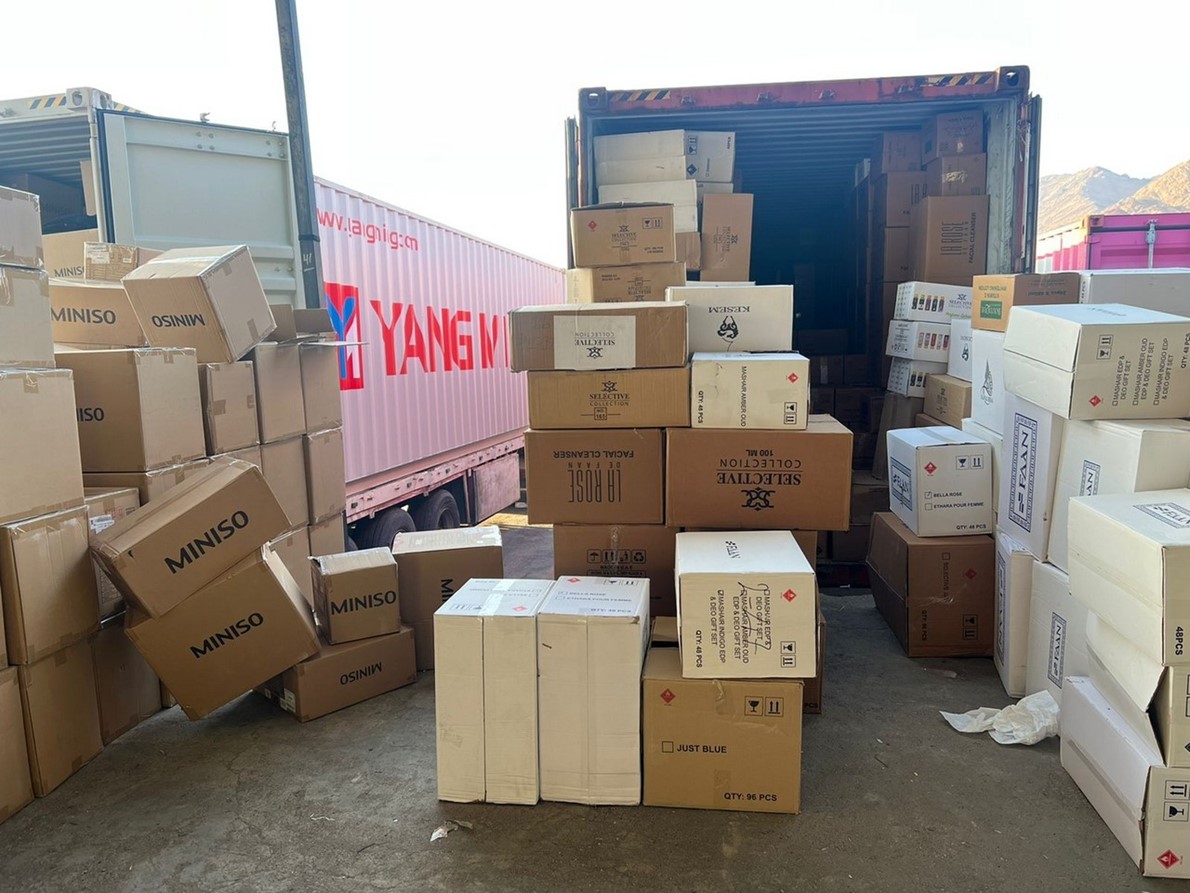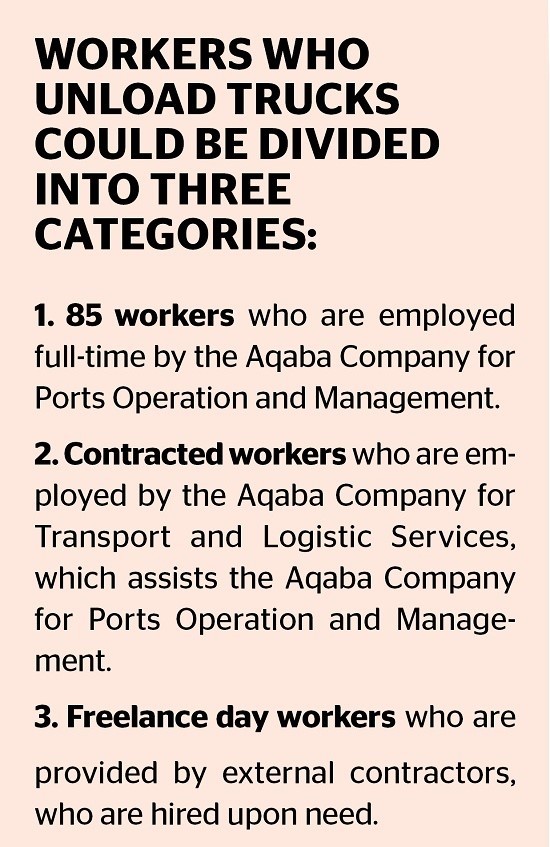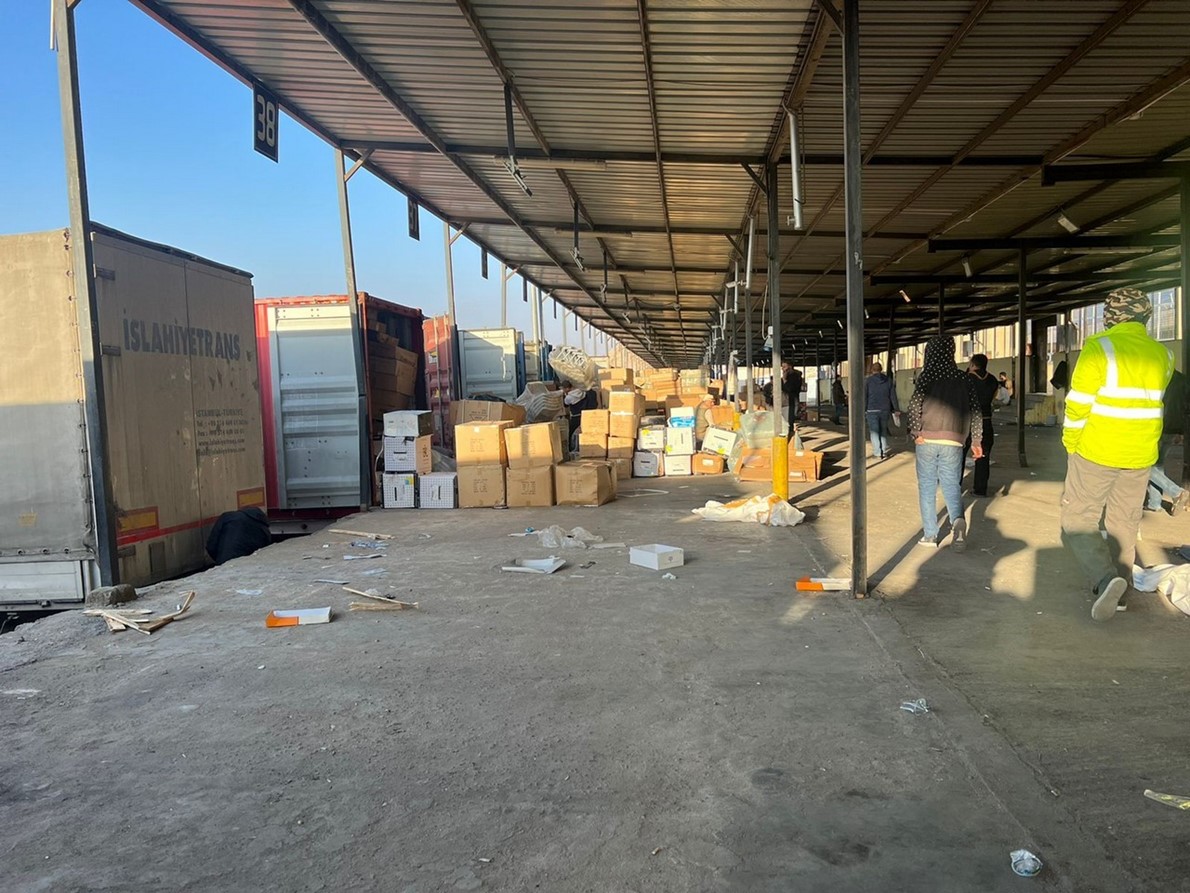Vessels laden with cargo bobble in the sea, sending waves crashing
against the shore in the
Red Sea Port of Aqaba, where ships, one-by-one, dock
at the pier.
اضافة اعلان
Once their cargo
is loaded onto trucks and arrives at Yard 4 for customs inspection, long delays
and hefty fees are expected.
Often, the
process takes several days to clear customs, which means wasted money on
docking fees and consumed energy for truck drivers and firms eagerly awaiting
their cargo to arrive at its final destination.
“I don’t get
paid for the time I spend waiting for the cargo to clear customs,’’ said truck driver Mae’n Rawashdeh.
The
Aqaba Company for Ports Operation and Management, which operates Yard 4, allows
trucks into a waiting area for free in the first 24 hours. If longer, a
“storage fee” of JD5–20 for each container is
levied per day for a period of seven days.

The fee varies
based on the type and size of the container and is charged to clearance
companies, even if the trucks were not responsible for the delay.
Truck driver
Firas Ibrahim complained that workers are usually unavailable at the site,
which causes another delay for cargo handling.
“I had the
container opened at 8:00 am, the inspector finished inspecting it four hours
later, but there were no workers to reload the cargo back in the container,’’
he said.
“I ended up
waiting more than four hours,” he complained.
Mohammad Jalal,
chairman of the Aqaba Clearance Companies owners committee, attributed the
inspection delays to “insufficient customs ramps”.
Yard 4 has 64
ramps, where approximately 350 containers are inspected every day. There is
also 160 workers in the vicinity who unload containers and put them onto a belt
for X-ray examination
Jalal said: “In
normal situations, the inspection process needs more than six hours, therefore
the waiting period might last days.”
Dheif-Allah
Abu-Aqoula, head of the syndicate for Aqaba Clearance Companies in Jordan,
asserted the need for a sufficient number of trained workers to deal with
fragile and expensive goods.

He said workers
who unload trucks “deliberately procrastinate” and “won’t hesitate to ask for
extra payments in the form of gratuities, which could reach JD40, if they were asked to rush to complete their task.”
Delays Due to customs Inspection
Truck driver Mohammad, who insisted to be identified only by his first
name, said the delays are partly caused by unintended customs faults. In one
incident, he explained, Customs employees were forced to spend seven hours
inspecting goods manually after a malfunctioning X-ray machine showed what was
interpreted as suspicious cargo.
“This issue
closed the ramp for 10 hours at least,” he said.
Jalal, chairman
of the Aqaba Clearance Companies owners committee, said the delays are
exacerbated by customs’ inspection procedures. He explained that customs
adopted a gradual approach, which allows officers to inspect “small specimen”
in shipments and expand the search, if any violation was discovered.
“While it’s true
that out of every 1,000 containers, there’s about 23 that might contain
‘suspicious’ merchandise, each inspection though causes the ramps to close for
about twelve hours,” he said.
Abu-Aqoula, the
head of the syndicate for Aqaba Clearance Companies in Jordan, said that “all
containers pass through an X-ray machine to detect contraband, and the result
of the scan usually determines the lane that they should go to afterwards.”
Yard 4 has three
lanes: The Red Lane means that inspection goods and papers is mandatory. The
Yellow Lane means that documents should be verified before the cargo is
processed through. The third is the Green Lane, which means that neither the
goods, nor the documents need further inspection.
Abu-Aqoula
blamed the delays on the process of re-directing cargo containers from the
yellow and green to the red lane. Often,
he added, there is a staff shortage for the inspection, unloading and reloading
processes.

“Ninety-nine percent of the goods that are
transferred for further inspection after X-ray do not have any defects,” he
said. Sometimes, there is concern over
faulty goods stacking, he added.
The solution
would be to inspect the goods at the customs centers, as this would facilitate
the smooth movement of goods and limit the overall delays.
Importantly, he
added, there must be efforts to “streamline the officials” authorized to
request further inspection of goods. He noted that the process also involves
officials from the Standards and Metrology Organization, the Jordan Food and
Drug Administration, among others.
Col. Ahmad Al-Akalik, director of the
Aqaba Customs authority, said that his main task revolves around clearing cargo so
that it would proceed to its destination without delay.
But he added:
“The problem is that Aqaba is a border point and a customs clearance center,
therefore, goods that pass through are either transiting or entering Jordan,
and both categories must be inspected.”
Akalik revealed
that the Customs authority has taken many steps to tackle delays, such as
“minimizing the attention paid for transiting goods, while speeding up
inspection of goods bound for Amman or Sahab customs clearance centers, hence
there’s no need for such goods to be transferred to Yard 4.”
To achieve this,
customs urged the
Aqaba Special Economic Zone Authority (ASEZA) to increase the
number of handling staff, provided that loading and unloading workers tenders
must be conducted through an external supplier specialized in cargo handling
operations.
Additionally,
transit goods must exit automatically if their content need not be declared.
According to
Akalik, customs reduced to 2 percent their inspection criteria on transit
goods, while incoming goods are subject to 30 percent of such set criteria.
Mahmoud
Khleifat, a Commissioner of Revenue and Customs at ASEZA between 2015 and 2022,
objected to the current rise to 35 percent of goods inspected in Aqaba.
He said that
“contravened” ASEZA’s law, which sets inspection at a maximum of 15 percent,
which is “clearly responsible for the current bottle-neck problems”.
Khleifat wondered
“What’s the benefit of inspecting goods in Aqaba that are destined to the Iraqi
market? Transit goods should not be inspected to begin with, and the path that
transit containers must take can simply be tracked electronically to ensure the
process is secure enough.”
Read more Business
Jordan News



